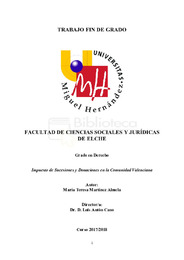Por favor, use este identificador para citar o enlazar este ítem:
https://hdl.handle.net/11000/6772Registro completo de metadatos
| Campo DC | Valor | Lengua/Idioma |
|---|---|---|
| dc.contributor.advisor | Antón Cano, Luis | - |
| dc.contributor.author | Martínez Almela, María Teresa | - |
| dc.contributor.other | Departamentos de la UMH::Ciencia Jurídica | es |
| dc.date.accessioned | 2020-12-04T18:17:00Z | - |
| dc.date.available | 2020-12-04T18:17:00Z | - |
| dc.date.created | 2018-09 | - |
| dc.date.issued | 2018-09-05 | - |
| dc.identifier.uri | http://hdl.handle.net/11000/6772 | - |
| dc.description.abstract | Los impuestos constituyen la principal fuente de financiación del gasto público en España basados en la igualdad y la progresividad, reconocidos por el artículo 31.1 de la Constitución. El Impuesto de Sucesiones y Donaciones es uno de ellos, concretamente, uno de los más controvertidos, entre otros motivos, por las profundas diferencias que existen entre Comunidades Autónomas por su carácter de tributo cedido. Tras la introducción, se plantea, en primer lugar, ofrecer una visión general del ISD respecto a la normativa vigente dentro del Sistema Impositivo Español, detallando la estructura del impuesto con el objetivo de comprender sus características y elementos esenciales, el ámbito territorial y el plazo de gestión. En segundo lugar, se busca analizar la evolución histórica del ISD en la Comunidad Valenciana, pasando por las distintas reducciones, tarifas, cuotas y bonificaciones, hasta llegar a su regulación actual. Concretamente, y a través de un supuesto práctico, se realizará una detención sobre las modificaciones más significativas que han ido surgiendo en las distintas regulaciones del impuesto y se analizarán aquellos aspectos más problemáticos, en comparación con otras CCAA. El trabajo finalizará con unas conclusiones orientadas a unificar y reflexionar sobre su contenido | es |
| dc.description.abstract | Taxes are the main source of financing public spending in Spain based on equality and progressivity, recognized by Article 31.1 of the Constitution. The Inheritance and Donations Tax is one of them, concretely, one of the most controversial, among other reasons, due to the deep differences that exist between Autonomous Communities due to their nature of ceded tax. After the introduction, it is proposed, first, to offer an overview of the ISD with respect to the current regulations within the Spanish Tax System, detailing the structure of the tax in order to understand its characteristics and essential elements, the territorial scope and the term of management. Secondly, it seeks to analyze the historical evolution of ISD in the Valencian Community, through the different reductions, rates, fees and bonuses, until reaching its current regulation. Specifically, and through a practical assumption, a stop will be made on the most significant modifications that have been emerging in the different tax regulations and those more problematic aspects will be analyzed, in comparison with other CCAA. The work will end with some conclusions aimed at unifying and reflecting on its content | - |
| dc.format | application/pdf | es |
| dc.format.extent | 44 | es |
| dc.language.iso | spa | es |
| dc.publisher | Universidad Miguel Hernández de Elche | es |
| dc.rights | info:eu-repo/semantics/openAccess | es |
| dc.subject | Comunidad Valenciana | es |
| dc.subject | donation | es |
| dc.subject | donación | es |
| dc.subject | impuesto | es |
| dc.subject | ISD | es |
| dc.subject | herencia | es |
| dc.subject | inheritance | es |
| dc.subject | tax | es |
| dc.subject | Valencian Community | es |
| dc.subject.other | CDU::3 - Ciencias sociales::Derecho: 34 | es |
| dc.title | Impuesto de Sucesiones y Donaciones en la Comunidad Valenciana | es |
| dc.type | info:eu-repo/semantics/bachelorThesis | es |

Ver/Abrir:
TFG-Mª Teresa Martínez Almela.pdf
992,79 kB
Adobe PDF
Compartir:
 La licencia se describe como: Atribución-NonComercial-NoDerivada 4.0 Internacional.
La licencia se describe como: Atribución-NonComercial-NoDerivada 4.0 Internacional.
.png)